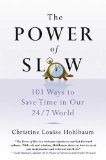Book review: The Power of Slow
This blog is reader-supported. When you purchase something through an affiliate link on this site, I may earn some coffee money. Thanks! Learn more.
Read our review guidelines.

But I have read The Power of Slow a couple of times, and I don’t have any notes on it.
I think I just got sucked in to the book, and read it fast, which was probably not the point.
Christine Louise Hohlbaum writes about techniques for being “slow” but she doesn’t mean managing your projects at a snail’s pace or missing milestones.
The book is subtitled 101 Ways to Save Time in our 24/7 World and for Hohlbaum, “slow” has a particular meaning.
“Slow means mindful,” she says. “When we become mindful, we automatically slow down to take a look at the big picture. It is not just about speed, but about the entire process of considering what’s truly important to you.”
In project management terms, being slow means better prioritization and being more productive. Each of the book’s chapters offers ten ways to save time by being better organized and clearer about what you actually want to achieve (except the last chapter, which just has one point, bringing the total to 101).
How often do you think that you could do the job of one of your team better and faster than they could?
Chapter 10 covers delegation:
“Keep a close watch on how the priorities of your project unfold, then delegate accordingly to ensure the highest quality outcome: Delegation requires a balancing act between autonomy and control. You want your delegates to soar while keeping an invisible tether on them in the event they get lost in the clouds: Milestones are important for checking in, but it is equally important to give your delegates a semblance of independence.”
Being able to share the work around is important for projects, as it means you can get more done, and manage the time more effectively. Oops.
According to Hohlbaum, time management doesn’t exist. “There’s no such thing as time management,” she writes, “since you can’t manage something you can’t control.”
Instead, she encourages readers to focus on managing what we do in the time that we have.
The book talks frequently about managing our relationship with time, and creating a better balance so that we don’t feel that time controls us. Essentially, this is all about the power of choice.
We can choose to listen actively to our project teams, when they bring us issues. Or we can listen with one ear while finishing off an email.
We can choose to say “yes” to every scope change, and then panic when the work won’t fit into the existing schedule. Or we can only take on what it is practical for the project to successfully deliver.
The Power of Slow is not a book about project management, but it is a useful book about the principles of working within the boundaries of time, and project managers do that every day.
There is some good advice in here about avoiding multi-tasking and getting rid of the little distractions that eat into the productive time in your working day.
If you want a purely project management take on getting the most out of your day and sitting in the comfy armchair of project management, read Peter Taylor’s The Lazy Project Manager. But if you want to take what you learned in that further, and really get to grips with what time means for you, in the workplace and at home, then read The Power of Slow.
